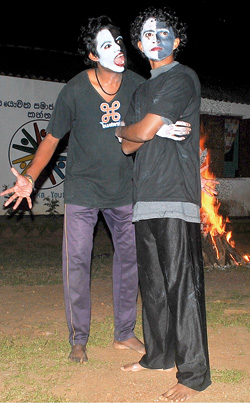The Language of Peace
View(s):2014 would mark the fifth anniversary of the end of a war that plagued this nation for more than 25 years. The Sri Lankan governmenwt declared the end of the war on 18th May, 2009. People all around the country were ecstatic at the news. The war had kept everyone awake most nights, the war was all some of us knew, we grew up to it.
‘The Language of Peace’ is the progarmme conducted by ‘Centre of Policy Alternatives’ (CPA) for participants with theatre productions, workshops and activities on promoting language equality. The script for the drama was written by Thamindri Aluvihare. The war was our early morning news and our bed-time story. It was what happened to our father, our brother, our neighbor, our friend. The war was our story and we won it.
 The story evolved around the language problems and different ethnic issues. ‘We now have, not one but two independence days where we stand in pride as “one nation” and celebrate as “one people”. But could we truly identify ourselves as “one people”? When the lady at the bus-stop asks how to get to Pettah in Tamil, are we capable of helping her? When we stop to ask for directions to the sea from the little boy who is standing outside his house in Batticaloa, are we capable of understanding him? If we are not capable of conversing in the two languages that are considered the national languages, could we truly regard ourselves as “Sri Lankans”? Conversation and communication are the bridges that connect peple through understanding, and understanding is the basis upon which mutual respect is built on. So will we remain oblivious to the burning-bridges, or are we going to win this peace?’
The story evolved around the language problems and different ethnic issues. ‘We now have, not one but two independence days where we stand in pride as “one nation” and celebrate as “one people”. But could we truly identify ourselves as “one people”? When the lady at the bus-stop asks how to get to Pettah in Tamil, are we capable of helping her? When we stop to ask for directions to the sea from the little boy who is standing outside his house in Batticaloa, are we capable of understanding him? If we are not capable of conversing in the two languages that are considered the national languages, could we truly regard ourselves as “Sri Lankans”? Conversation and communication are the bridges that connect peple through understanding, and understanding is the basis upon which mutual respect is built on. So will we remain oblivious to the burning-bridges, or are we going to win this peace?’
The Centre of Policy Alternatives has initiated a program promoting language equality with the intention of propelling the course of winning the peace by ensuring that the Offical Language Policy is appropriately implemented in both the government and private sectors. In par with the objective, the project is conducting field research and engaging with communities in order to deduce the progression of the implementation process. Thus far, many challenges had been met with in both the private and government sectors and they have been often amicably resolved with the assistance of all stakeholders involved.
The Centre also recognizes that awareness in needed among the general public regarding the reasons for pushing for language equality. With this prerogative in mind, newspaper articles were commissioned on the subject of Language Rights and newspapers were monitored regarding the trajectory of the dialogue regarding this subject matter. During the time of the project a significant increase was noticed of the amount of newspaper articles regarding the implementation and the progression of the trilingual national policy.
This trend goes hand in hand with the inception of projects regarding this issue by, both government and non-government sectors alike, drawing attention from the Ministry of National Languages and Social Integration as well. Certain steps taken by them such as replacing all public signs with trilingual sign boards are commendable. The media has been able to provide coverage to all such events, thus enlightening the general public in its regard. A discussion regarding language rights issues were more intense in the months leading to CHOGM during which the United Nations High Commissioner for Human Rights, Navi Pillay drew attention to the post war situation of the island.
However, the attention provided to this subject matter is limited to academic discourse or publicity of state sanctioned events.. While the effort is commendable, it is important that the media, as the third eye of the society, direct people’s attention to the importance of respecting the language rights of Sri Lankans on a day to day level. It is imperative that more articles regarding the language situation in Sri Lanka are written and published in laymen’s terms directed towards a wider public audience.
- Thamindri Aluvihare


